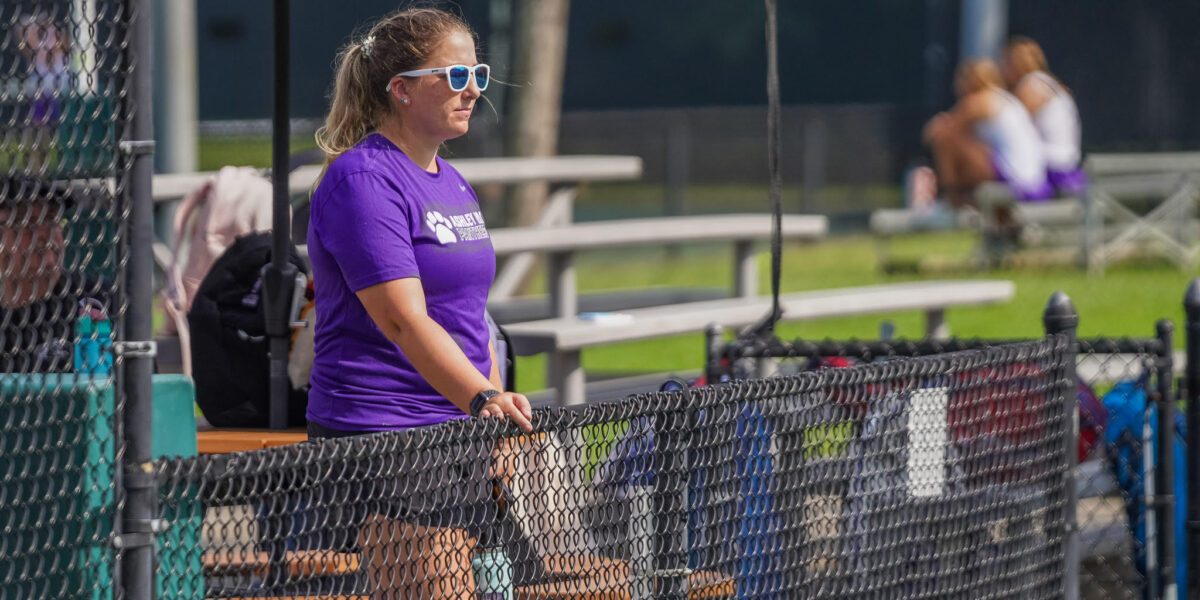Back to News
Athletics9/6/23
Getting to Know Athletic Trainer Julia Lener and How She’s Working with Ashley Hall Athletes

As a student-athlete, Ashley Hall athletic trainer Julia Lener never wanted to see her high school trainer. “I was that stubborn athlete who didn’t want to go into the training room,” Lener says with a laugh. “When I got hurt, I always tried to avoid it as much as possible.”
But when she got tendonitis in her rotator cuff playing softball her senior year, things changed. “I had a trainer who took the initiative, and it made all the difference,” she says. “He took me out which was mentally really tough on me, but the relationship I ended up building with him was so important to me at that period of time in my life. Honestly, that’s what pushed me to athletic training. I knew how much he cared about me, and I wanted to give that to someone else.”
In August 2023, Lener joined Ashley Hall as the School’s first-ever full-time athletic trainer. “As our athletic trainer, Julia will play a vital role in supporting our athletes and coaches,” says Assistant Athletic Director Christian Alcantara. “She will work closely with the coaching staff to develop comprehensive training and conditioning programs, provide immediate medical attention during practices and competitions, and assist in the rehabilitation of injured athletes.”
As she gets settled in her new role, we sat down with Lener to hear more about her background, where her focus is as she works with athletes, and why she chose to join the Ashley Hall community.
Preventing injuries
Last year, Lener worked with the University of Alabama’s men’s and women’s tennis teams where she earned her master’s degree in health studies. “Working in tennis last year at the collegiate level, we were very focused on preventative and functional assessment,” Lener says. “That’s what I strive to do here because I feel like if we have that in place, we’ll see great results when it comes to decreasing numbers of injuries.”
Lener also stresses the importance of working with students before a season starts, especially when it comes to supporting young athletes starting a new sport. “A lot of training is knowing what to expect,” Lener says. “It’s about giving them guidance of what a sport entails strength wise, how you should train, etc. Once we inform them of how the sport works, it’ll not just educate them on how to play the sport itself, but build a sense of confidence, too.”
Building trust
“People stereotype athletic trainers as the people that take you out of the game,” Lener says. “So nobody ever wants to come to us, but taking an athlete out of competition is never our goal whatsoever. So that’s why one of my goals is to build relationships. Trust is everything.”
One way Lener is building those relationships already is her open door policy that encourages athletes to come see her even if they are not injured. “I’m not here to make changes in your life unless you want to make them,” Lener says. “I’m here to give you advice and support, so you don’t have to come to me if you just have an injury. You can come to me for nutritional advice, hydration advice, equipment training, things like that. It’s about having the door open.”
Supporting students through injuries
While playing softball at Southern Connecticut State University where she earned her bachelor’s degree in athletic training, Lener was misdiagnosed with an injury for about a year. The injury finally led to surgery and rehab. “I felt very alone when I was in rehab,” she says. “I just wasn’t getting the support I needed, and you’re at a very vulnerable point in your life.”
Knowing firsthand how important a strong support system is for athletes working through injuries, Lener chose Ashley Hall. “Something that drew me to Ashley Hall was the athletics staff,” she says. “They are just truly incredible, and feeling confident that I have a support system is exactly how I want our athletes to feel. I want them to know I’m gonna guide you through any injury, or if you’re not comfortable with me guiding you, we’re gonna find somebody to help you through this, whether that’s PT or an outside referral. That’s my biggest thing.”
